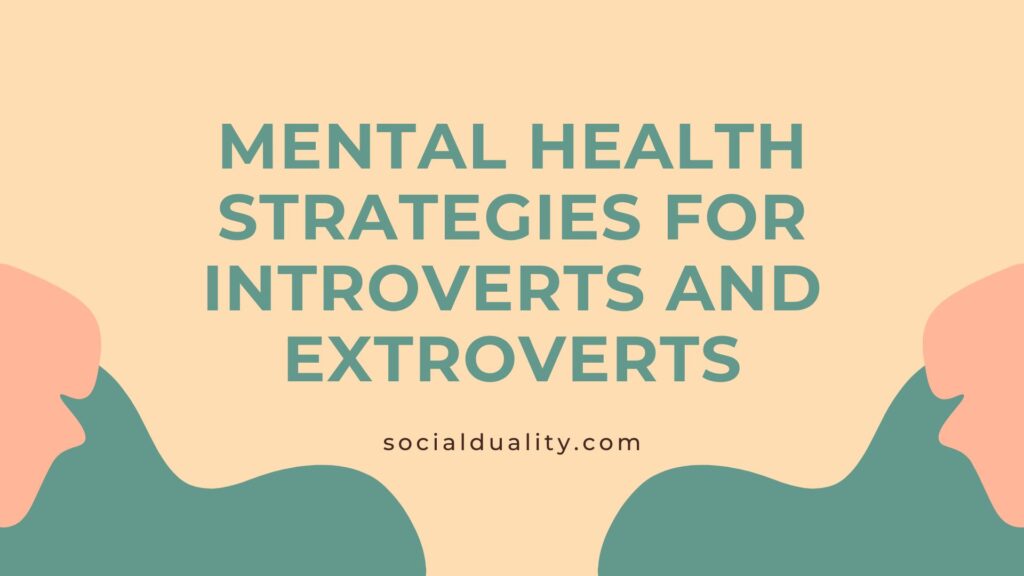Navigating the terrain of mental health can often be a complex task, particularly when considering the varying needs of introverts and extroverts. Your personality type plays a critical role in shaping your mental wellness, with introverts and extroverts facing distinct challenges.
For introverts, the quiet solitude that replenishes them can sometimes lead to overthinking and isolation, heightening the risk of mental health issues. Extroverts, on the other hand, thrive on social interactions but may sidestep introspection, leaving underlying issues unaddressed. This article aims to shed light on how to recognize mental health symptoms in these two personality types and provide effective coping strategies, fostering a healthier balance.
Key Takeaways
- Personality types, such as introverts and extroverts, have a significant impact on mental health.
- Introverts may experience symptoms of mental distress through excessive isolation, overthinking, and perfectionism, potentially leading to depression and anxiety.
- Extroverts, on the other hand, may mask their mental struggles through constant socializing, with symptoms being less obvious.
- There are effective coping strategies for both: introverts can benefit from scheduled alone time and mindfulness practices, extroverts can find balance through a mix of social and alone time, and self-reflection activities.
- Both can access mental health resources and stress management techniques, such as online therapy and relaxation techniques for introverts, and in-person therapy and group activities for extroverts.
The Intersection of Personality Types and Mental Health
The crossroads where an individual’s personality type meets their mental well-being is an intriguing area of study. Introverts and extroverts face different mental health challenges due to their contrasting tendencies. As introverts favor solitude, they may often find themselves lost in thought, which can sometimes spiral into overthinking. This can escalate into more serious mental health problems if not addressed. Meanwhile, extroverts thrive in social environments, but this outward focus can sometimes mean they neglect self-reflection, allowing underlying issues to fester.
Here are some mental health tips for introverts and extroverts to consider:
- Introvert mental health strategies: Practice mindfulness, engage in activities you enjoy alone, and make time to check in with yourself.
- Extrovert mental health advice: Balance your social activities with periods of solitude for introspection.
- Balancing mental health for introverts and extroverts: Both personality types can benefit from regular mental health check-ins with a professional, adopting effective coping mechanisms, and practicing self-care.
For additional insights on how introverts can navigate social situations, you can refer to our in-depth guide on how introverts network effectively. Conversely, for extroverts, it’s beneficial to understand the value of introspection in maintaining mental wellness. This balance of self-reflection and social interaction can help both personality types manage mental health challenges effectively.
Recognizing Mental Health Symptoms in Introverts
Identifying signs of mental distress in introverts is a critical step in managing mental health for introverts. Introverted individuals may exhibit certain symptoms that could point to possible mental health problems. These can include excessive isolation, a tendency to overthink, or an unhealthy pursuit of perfectionism.
If you’re an introvert, you may notice changes in your sleeping patterns, appetite, or mood swings. These are telltale signs of a possible mental health issue. If you are experiencing any of these symptoms, it’s wise to seek professional help. Mental health professionals can provide you with coping mechanisms for introverts and extroverts alike.
| Recognizing the Symptoms | Introvert Mental Health Strategies | Extrovert Mental Health Advice | Balancing Mental Health for Introverts and Extroverts |
|---|---|---|---|
| Excessive Isolation | Practice mindfulness | Balance social activities | Regular mental health check-ins |
| Overthinking | Engaging in solo activities | Include periods of solitude | Adopt effective coping mechanisms |
| Unhealthy Perfectionism | Regular self-checks | Reflect on social interactions | Practice self-care |
Remember, mental health awareness is an ongoing process, and it’s okay to have mental health days. With the right support and self-care for introverts and extroverts, maintaining mental wellness is attainable.


Identifying Mental Health Issues in Extroverts
As we turn our focus to extroverts, it’s clear that they face their own set of mental health issues. Unlike introverts, extroverts might conceal their mental health struggles behind high-energy social interactions. They might seem like they’re always on top of the game, but watch for signs they’re using socializing as a crutch to avoid personal problems. Extroverts might not demonstrate typical signs of distress like withdrawal, making it tricky to spot issues.
| Extrovert Mental Health Red Flags | Possible Underlying Mental Health Issues |
|---|---|
| Excessive socializing | Anxiety |
| Inability to enjoy solitude | Depression |
| Intense fear of missing out | Social anxiety |
| Over-reliance on others for validation | Low self-esteem |
If you’re an extrovert dealing with mental health issues, it’s okay to take a mental health day and speak to a mental health professional. Let’s shed the stereotypes and assumptions about extroverts always being fine. We all need support sometimes, no matter how outgoing we might be.
For more advice on managing mental health for extroverts, visit our blog post that dives into self-care strategies for both personality types.
Effective Coping Strategies for Introverts and Extroverts
Introverts and extroverts, your coping strategies are here! Let’s talk about a handful of mental health tips for introverts and extroverts alike. To start, introverts, quiet time is your friend, but remember – balance is everything. Too much solitude can bring about negative feelings and thoughts. On the other hand, extroverts, continuous social interactions might leave no room for self-reflection. This might make you overlook some signs of emotional distress.
For both personality types, practicing mindfulness and meditation can work wonders. It helps keep overthinking at bay for introverts and encourages self-reflection for extroverts. Creating a small, supportive social network can benefit both parties too.
Stress management is another critical factor. Introverts, engage in solo hobbies to unwind. Extroverts, group activities might help diffuse your stress.
And remember, if things get tough, professional help is always a good option. Be it online therapy for introverts or in-person sessions for extroverts, professional guidance can lead to better mental wellness.
As they say, knowledge is your superpower. Understand your personality, recognize the mental health challenges linked to it, and equip yourself with suitable coping mechanisms. It’s all about finding what works for you. Your mental health matters, so take care of it.
7 Self-Care Tips for Introverts
Navigating through the intersection of personality types and mental health can be a challenge. Yet, it’s a worthwhile endeavor for introverts who may struggle with overthinking and isolation, which often lead to mental health conditions. Recognizing these symptoms is the initial step in managing mental health for introverts.
Self-care for introverts can be as simple as scheduling alone time or as profound as regularly evaluating one’s mental state. Engaging in creative activities, practicing mindfulness, setting personal boundaries, and fostering a supportive social network are all effective introvert mental health strategies.
On the other hand, extroverts face their own set of mental health challenges. They often use social interactions to mask mental distress, which can lead to ignoring underlying issues. Balancing social life with alone time, reflecting on social motives, and developing independent hobbies are some beneficial mental health tips for extroverts.
| Self-Care Strategy | Introverts | Extroverts |
|---|---|---|
| Alone time | Yes | Balanced |
| Social Interaction | Selective | Balanced |
| Mindfulness | Yes | Yes |
| Independent Hobbies | Yes | Yes |
| Regular Mental Health Check | Yes | Yes |
In essence, both introverts and extroverts can benefit from practicing mindfulness, maintaining a healthy social life, and regularly checking in on their mental state. It’s about finding a balance that works for you and sticking to it. Remember, mental health is a marathon, not a sprint.
Extrovert’s Guide to Mental Wellness
Stepping into the shoes of an extrovert, you might find a different set of mental wellness challenges. Being socially active doesn’t exempt you from mental health issues. You could be dealing with anxiety or battling stereotypes and assumptions about your personality type. So, let’s share some extrovert mental health advice to support your well-being.
- Balance social interactions with alone time. It’s okay to enjoy solitude, it allows for self-reflection.
- Understand your social motives. If you’re avoiding personal issues, it’s time to acknowledge them.
- Learn mindfulness. This helps you stay grounded in the present.
- Find independent hobbies. You don’t always need company to enjoy activities.
- Seek help if necessary. It’s perfectly fine to reach out to a mental health professional.
- Nurture a supportive network. Quality over quantity always matters in friendships.
- Self-reflect. Regularly check in with yourself on your mental state.
Remember, in the pursuit of mental wellness, there’s no one-size-fits-all. It’s all about what works best for you in your experience of mental health. On our blog, we’ve compared the communication styles of introverts and extroverts, which complements today’s topic. You’d find it useful.
Balancing Mental Health: Common Challenges and How to Overcome Them
As we navigate the tightrope of mental well-being, it’s evident that introverts and extroverts face different hurdles. For the inward-focused, the risk of overthinking and isolation looms large. Extroverts, on the other hand, may overlook their personal issues in the hustle and bustle of social interactions.
To dodge these pitfalls, introverts might find solace in solo hobbies, relaxation techniques, or online therapy. Extroverts, conversely, may benefit from group activities, grounding practices, or in-person therapy.
But what if we could strike a balance? A blend of mental health tips for introverts and extroverts could include setting personal boundaries, fostering a supportive social network, and practicing mindfulness. Incorporating these introvert mental health strategies and extrovert mental health advice might just be the ticket to a healthier mind.
We discuss more on coping mechanisms for introverts and extroverts in our blog post. It’s a great resource for those looking to better manage their mental health, regardless of their personality type.
Stress Management Techniques for Introverts and Extroverts
Navigating the stress-laden path of mental wellbeing requires different strategies for introverts and extroverts. When it comes to mental health tips for introverts and extroverts, it’s not a one-size-fits-all approach. Introverts, for instance, might find peace in solitude and creative activities. Regular self-assessment of their mental state can help them stay on top of any emerging mental health issues. On the flip side, extroverts may need to balance their social life with periods of solitude to maintain their mental wellness.
Developing hobbies that don’t rely on others and self-reflection activities can be beneficial. The goal is to strike a balance, tailoring the approach to individual needs. This could mean setting personal boundaries, practicing mindfulness, or fostering a supportive network. Whatever your personality type, remember to seek professional help if needed.
| Strategy | Introverts | Extroverts |
|---|---|---|
| Social Needs | Small, supportive network | Balanced social life |
| Personal Time | Scheduled alone time | Regular self-reflection |
| Coping Mechanisms | Creative activities, mindfulness | Grounding techniques, hobbies |
| Mental Health Check | Regular self-assessment | Introspection, not avoiding personal issues |
| Professional Help | Sought when needed | Sought when needed |
Remember, mental health is a continuous process, and it’s okay to seek help. It’s not about being perfect; it’s about being balanced and healthy.


Mental Health Resources for Introverts and Extroverts: A Comparative Analysis
Examining resources for managing mental health, it’s clear that both introverts and extroverts require different approaches. The introvert mental health strategies often involve alone time and introspection, utilizing measures like online therapy, books, and relaxation techniques. This caters to their need for solitude and helps combat their likelihood of overthinking, a common trait that could lead to a mental health condition.
Conversely, mental wellness for extroverts requires a careful balance of socialization and self-reflection. Extroverts can benefit from in-person therapy, community engagement, and group activities that reduce stress. It’s critical for extroverts to recognize if their social interactions are a mask for underlying issues, as it might exacerbate their experience with mental health.
To conclude, there is no one-size-fits-all approach in dealing with mental health. Be it anxiety or any other issue, it’s necessary to break free from stereotypes and assumptions and opt for a more personalized approach. After all, every individual, whether an introvert or extrovert, experiences mental health in their own distinct way.
Conclusion
When it comes to prioritizing your mental health, it’s all about balance and self-awareness. Take into account your personality type and how it influences your mental state. Are you an introvert or an extrovert? Remember, it’s okay to be one or the other, but it’s good to know where you stand. This helps you to spot signs of distress and take appropriate steps to better your mental health.
Time to take a moment and reflect on your own mental health strategies. Are you making the most of your personality type? Are you an introvert practicing mindfulness or an extrovert maintaining a healthy support system? Keep in mind the resources available to you. Use them wisely and remember to seek help if necessary.
To wrap things up, mental health is no laughing matter. But, with the right tools and strategies, managing mental wellness can be a walk in the park. So, don’t be hard on yourself. Take care of your mind, it’s the only one you got! Remember, it’s not a race, but a lifelong marathon. Keep your mental health in check, and you’re all set for a happier, healthier life.
What are some mental health strategies for introverts?
Introverts can benefit from scheduling alone time to recharge, practicing mindfulness, setting personal boundaries, and fostering a small, supportive social network. They should engage in creative activities and regularly assess their mental state. It’s helpful to seek professional help if they need it.
How can extroverts maintain their mental health?
Extroverts should balance their active social life with some alone time, reflecting on their motives for social interactions. Engaging in activities that promote self-reflection can be beneficial. They should practice mindfulness, build hobbies that don’t rely on others, and maintain a healthy support system. If they find themselves avoiding personal issues, they should seek help.
How can personality types influence mental health?
Personality types can greatly influence mental well-being. Introverts, who tend to recharge alone, can be prone to overthinking and isolation, which can increase susceptibility to mental health issues like depression. On the other hand, extroverts, who thrive off social interactions, might avoid introspection, leading to underlying issues being ignored.
What are some signs of mental distress in introverts and extroverts?
Introverts may show signs of mental distress through excessive isolation, overthinking, or perfectionism. Changes in sleep patterns, appetite, and mood can be indicative. Extroverts, on the other hand, might mask their mental struggles through constant socializing. If their social interactions are driven by a need for attention or a desire to avoid personal issues, it could indicate mental distress.
What resources are available for introverts and extroverts to manage stress?
Relaxation techniques like breathing exercises and solo hobbies can help introverts manage stress. Online therapy and support groups, as well as books and self-help resources focused on introspection, can be beneficial. For extroverts, group activities that reduce stress and grounding techniques during alone time can be useful. They might benefit from in-person therapy, social support groups, and activities that promote community engagement.


